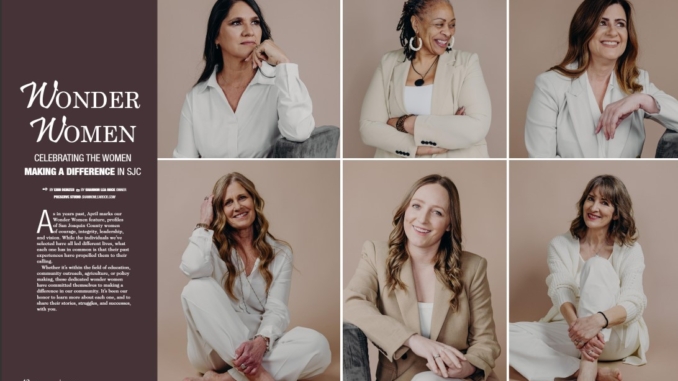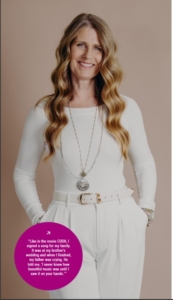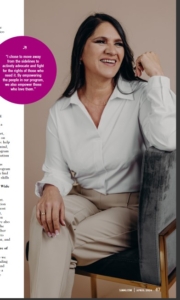
As in years past, April marks our Wonder Women feature, profiles of San Joaquin County women of courage, integrity, leadership, and vision. While the individuals we’ve selected have all led different lives, what each one has in common is that their past experiences have propelled them to their calling.
Whether it’s within the field of education, community outreach, agriculture, or policy making, these dedicated wonder women have committed themselves to making a difference in our community. It’s been our honor to learn more about each one, and to share their stories, struggles, and successes, with you.
Annie Cunial
— The Proponent
Annie Cunial was born to parents who met living next door to each other when they were kids.
Growing up, she attended school in Stockton and Manteca, so perhaps it’s kismet that she’d return to her educational roots to work in the same school system she was a product of.
Following her graduation from Chico State, Annie began a teaching career in Manteca. After her work with grade school, high school, and ESL students, she eventually “graduated” to working for the San Joaquin County Office of Education (SJCOE) as an events coordinator, then moved into her current role as the division director of the largest STEM (Science, Technology, Engineering, Math) office of any county educational district in the state.
Is there someone you consider a mentor or that you look up to for inspiration?
“My parents were my first role models. They wanted me to have opportunities they didn’t, and my work ethic comes from them. They gave me the gift of encouragement and unconditional confidence. It doesn’t matter if you’re 3 or 53, there’s no better feeling than your parents being proud of you.”
What are your goals for the future of STEM in SJC?
“Working in the STEM program at SJCOE, where we serve about 52,000 students, is probably the most fun you can have in education. The program prepares students for (and exposes them to) jobs in growing fields like computer science, data analytics, and coding, as well as environmental and sustainability roles. As a testament to our commitment and dedication, our STEM program was recently awarded a $50M grant from the California Department of Education.
“I hope our students will recognize the opportunities around them and want to stay or return to this area to live, invest, and make a positive impact.”
___________________________________________________________________________________________________
Toni McNeill
—The Activist

Born and raised in South Stockton, Toni McNeill experienced a myriad of problems wreaking havoc on her community. Many of the societal determinants such as under-resourced schools, over-policing, and the “war on drugs” were negatively impacting the young people growing up there, creating a seemingly unsurmountable barrier.
But out of that chaotic concrete environment, a rose bloomed.
Rather than allowing her situation to define her, Toni sought to change the narrative. Escaping from poverty, homelessness, and a lack of foundational resources, she focused her energy on what she’s always done best: mentoring, leading, and advocating.
Today, she’s the founder and executive director of Concrete Development, an organization of formerly incarcerated, inactive gang members who seek to influence positive change within their communities. Not one to stop growing, Toni recently participated in a first-of-its-kind, six-month intensive on community violence intervention training and was honored at a White House graduation ceremony.
What are the building blocks of the program at Concrete Development?
“It’s based on a three-tiered approach consisting of mentors, peers, and mentees. The first tier asks you to have one-to-three mentors you can reach out to and count on. The second requires that you have three-to-five peers who you’re accountable to. And the last is to have three-to-five mentees that you work with to help them navigate their personal journey. If any tier is missing, you won’t succeed.”
What is something unexpected about the San Joaquin Valley community?
“We’ve endured economic depression, bankruptcy, natural disasters, and more—yet we’ve overcome. We learn from our mistakes as a community, and we seek to become stronger and better, and to create a welcoming place for all.”
_________________________________________________________________________________________________________________
Melinda Wilson
—The Interpreter

If you’ve ever seen the movie CODA, in many ways it mirrors the life of Melinda Wilson, who’s also a Child Of Deaf Adults.
Melinda’s parents are both deaf, as is her brother. Growing up in a home where she was the only hearing person in the family meant that a lot of communication with the outside world happened through her. As a child, she remembers having to take phone calls and relay the information back-and-forth to her parents, who she learned sign language from so they could communicate as a family.
This lifelong connection to sign language eventually led to her occupation as an Educational Sign Language interpreter for deaf children within the San Joaquin County school system.
What is your role within the classroom?
“I learned that many deaf children were being raised without the use of sign language at home, which we call ‘language deprivation.’ Within the San Joaquin system, deaf students are mainstreamed into public education classes with a sign language interpreter to facilitate communication between the student and their teachers and peers.
“One of my joys is to teach hearing families with deaf babies American Sign Language through the SJCOE because it’s also important for parents to learn ASL so they can create a loving, supportive relationship with their child.”
Do you have a mentor or someone you look up to?
“My life-long friend, Barry, is also CODA. He’s the one who encouraged me to take the test to determine my signing abilities, then helped guide me to take classes and attend workshops so I could eventually retest and get to the level the state required for working with students in deaf education.”
______________________________________________________________________________________________________________
Monica Stelmack
—The Advocate

Living in California as a young, single mother who’d immigrated from Mexico without knowing English, Monica Stelmack wasn’t exactly set up for success. Then, after moving to the San Joaquin Valley, her second child was diagnosed with autism—news made especially difficult due to language barriers, a lack of family nearby, and no real-world experience with the condition.
But she resolved to learn English and everything she could about autism. She focused on finding better employment and worked her way up in pay and position. After meeting and marrying her second husband, she returned to school and obtained a bachelor’s in business science.
In 2021, with her husband’s support, Monica quit her fulltime job to focus on something she’d always wanted to do: help other parents like her. With that in mind, she co-founded Wide Horizons, a program designed to help young adults with autism and other neurodiverse challenges. Since its inception, the non-profit has welcomed 19 participants to their program providing scholarships, helping them find employment, and teaching them the skills they need to live independently.
Why is the work you’re doing at Wide Horizons necessary?
“Because our participants need to learn how to become more self-reliant. We’re focusing our energy and attention on identifying and planning what’s most important—like money management, organization, communication, or even how to cook for themselves. But we’re also helping parents and caregivers find the services their children need. As another mother of a disabled child once said to me, ‘We are the voices of our children, and we must fight for them.’”
What are your goals for the future of the organization?
“To increase the number of people we serve. We’re working on securing funding that will allow us to hire more staff and find a permanent location to provide a space for our participants to practice vocational and employment skills.”
__________________________________________________________________________________________________________________
Natalie Collins
—The advocate

When Natalie Collins was growing up in San Joaquin County, she was surrounded by the agricultural fiber of the area and became involved in 4-H and Future Farmers of America, which undoubtedly influenced her decision to pursue a college degree in agricultural business.
That passion to be part of the agricultural industry led Natalie on the path to her current position as president of the California Association of Winegrape Growers (CAWG), a lobbying organization for winegrape producers in the state—many of whom live and farm in the San Joaquin Valley. (There are approximately 90,000-100,000 acres of planted wine grapes with vlue of round $450-500 million annually).
As only the fourth president in the 50 years of CAWG’s existence, Collins is poised to take California winegrape growers into the future.
Under your administration, will there be a shift in focus on issues concerning the industry?
“One example of what’s changing is that we’re more concerned with wildfires, which now have their own ‘season,’ and are deeply impacting growers all over the state. As a result of recent governmental policy, which CAWG had a hand in, millions of federal dollars will go towards research on the impact of smoke from those fires, including how tainted grapes can affect the taste of the wine that’s made from them, and what growers can do to mitigate the damage.”
You’ve been selected as a 2024 “Wonder Woman,” but which superhero do you admire most?
“For me, it would be Captain Marvel. She exudes confidence and clarity in action, doesn’t waver from her internal moral compass, and inspires women to embrace their strength and fight for what they believe in.”
_____________________________________________________________________________________________________
Kathryn Siddle
– The Barrier Breaker

Despite your best efforts, oftentimes it’s hard to see your way out of the forest when there are so many trees. Such is the case with the homeless crisis; the hurdles can seem so vast that nothing ever really changes.
In her hometown of Lodi, it was becoming apparent to Kathryn Siddle that the homeless situation was untenable. But because no one was offering comprehensive, accessible services, there was no way for most of them to break out of the cycle.
With the support of the Lodi Committee on Homelessness, Kathyrn, a career social worker, started working out of her car to gain access to benefits for people living in the city’s parks. She started by helping them obtain social security and disability benefits, then began picking up and delivering medications, scheduling healthcare appointments, making sure they got where they needed to go, and took the time to get to know them.
As a reflection of the impact her community service has had on Lodi, Kathryn recently received the 2024 San Joaquin Susan B. Anthony Award.
Tell us about your work with the unsheltered in Lodi.
“When I first got involved, one of the major issues was that services weren’t being received. The idea of ‘whole-person care’ is a way of dealing with people as individuals with different needs. So, I started with a question: ‘What is your situation and what’s the barrier?’ And many times, it was as simple as finding shelter for them and their 3-P’s: possessions, pets, and partners.
“After I realized that was an issue, I worked to create a low-barrier shelter. The result was a large tent that was set up inside an abandoned building. The shelter we created provides a home for 80 people on a 24/7 basis, and offers a secure location, mobile showers, and food.”
You’ve been recognized as a Wonder Woman, but which superhero do you admire most?
“Peter Quill, leader of the Guardians of the Galaxy. He loves the music his mother raised him on, he often suggests ‘dance-offs’ to solve problems, he’s resourceful, and he became captain of a ship with an amazing, special crew—including a raccoon as his co-pilot!”

